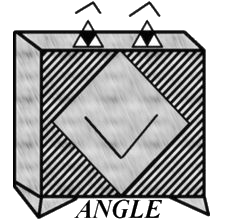

Moving the Bow
Now you know how to find the Bow Contact-Point at different Bow-Segments.
The Bow-Arm forms many shapes, so it seemed logical to ask ARC and ANGLE to lead the team and teach everyone the details.
For now, I am on my way to meet SCROLL in the computer lab in order to compose your bowing exercises. Today, there is some really fantastic music software available, which make music creation quite efficient.
Just imagine if great composers like Bach and Mozart had the technology we use today, back in their day.

I’m looking forward to Q’s Bowing Exercises. Presently, Q will compose music to be played on the Open Strings. With Scroll at Q’s side, these bowing exercises promise to be fun and challenging.
The goal is for everyone to gain exceptional bowing skill on all of the strings at all bow segments, parallel to the bridge and with focused bow hair contact.
Learning the shapes formed when bowing, helps you to master the art of drawing the bow.

Always play with the proper arm height, one that supports the string that you are playing at the time. Remember to feel as if your bow-arm is floating to position.
Once you master the skills of your bow-arm in action, increased control over your bowing performance is the result. With practice, you can polish your sound production and create exceptional tonal sound paintings. Always listen to your sound.
Great News! Q and Scroll have completed composing the Bowing Exercises.

They probably would have composed even greater amounts of fine music and avoided writer’s cramp. Suddenly, I feel quite inspired. Bowing exercises await! Take it away, guys.
Producing a rich string tone is cool!
Introducing the Bow Parts of the Bow The Stick Horse-Hair The Tip The Frog The Winding How the Bow Works
Rosin Preparing to Hold the Bow Stick Training Exercises Bowing Terminology Down-Bow Up-Bow
Bow-Hand Set-Up Finger Tasks and Functions The Thumb Meet ARC Finger Segments The Index-Finger
Bow-Hand Pronation The Center-Finger and Ring-Finger Bow-Hand Fulcrum Ring-Finger Propulsion Bass Bows
Pinky Bow-Tasks ‘Casting’ the Bow-Hand Bow-Wrist Tasks Rotational Inertia Arco Clay Smile Exercise Meet ANGLE
The Bow-Arm Box The Shoulder Arc Bow Contact-Point String Lanes Bow-Segment Mastery Bowing Exercises
Finding the Bow Contact-Point “Painting With Sound” Bowing Exercises Menu Bow Taps Bowing Traditions
Perform Down-Bows Perform Up-Bows The Art of the Bow-Change Articulations Staccato Legato
Mastery Checkpoint One Building Bow Control Bow Speed and Bow-Arm Motion Bow Planning and Distribution
Slow Moving Bow Strokes Individual Bow Segments Traveling the Bow Bowing Dynamics Mastery Checkpoint Two
Advanced Techniques Slurs and Articulations Slur Training Locating the Bow’s Balance Point Ricochet and Spiccato
Exploring Ricochet Ricochet Control Spiccato Training Spiccato Control Spiccato Brush Strokes
Multiple String Crossings Virtuosic Bow Strokes Arpeggio Bowing “Flying” Staccato Mastery Checkpoint Three
SCROLL’s List of Bow Strokes
Rosin Preparing to Hold the Bow Stick Training Exercises Bowing Terminology Down-Bow Up-Bow
Bow-Hand Set-Up Finger Tasks and Functions The Thumb Meet ARC Finger Segments The Index-Finger
Bow-Hand Pronation The Center-Finger and Ring-Finger Bow-Hand Fulcrum Ring-Finger Propulsion Bass Bows
Pinky Bow-Tasks ‘Casting’ the Bow-Hand Bow-Wrist Tasks Rotational Inertia Arco Clay Smile Exercise Meet ANGLE
The Bow-Arm Box The Shoulder Arc Bow Contact-Point String Lanes Bow-Segment Mastery Bowing Exercises
Finding the Bow Contact-Point “Painting With Sound” Bowing Exercises Menu Bow Taps Bowing Traditions
Perform Down-Bows Perform Up-Bows The Art of the Bow-Change Articulations Staccato Legato
Mastery Checkpoint One Building Bow Control Bow Speed and Bow-Arm Motion Bow Planning and Distribution
Slow Moving Bow Strokes Individual Bow Segments Traveling the Bow Bowing Dynamics Mastery Checkpoint Two
Advanced Techniques Slurs and Articulations Slur Training Locating the Bow’s Balance Point Ricochet and Spiccato
Exploring Ricochet Ricochet Control Spiccato Training Spiccato Control Spiccato Brush Strokes
Multiple String Crossings Virtuosic Bow Strokes Arpeggio Bowing “Flying” Staccato Mastery Checkpoint Three
SCROLL’s List of Bow Strokes



